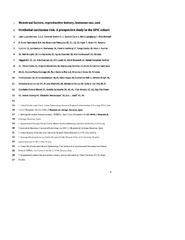Lujan-Barroso, Leila; Botteri, Edoardo; Caini, Saverio; Ljungberg, Börje; Roswall, Nina; Tjønneland, Anne; Bueno-De-Mesquita, Bas; Gram, Inger Torhild; Tumino, Rosario; Kiemeney, Lambertus A.; Liedberg, Fredrik; Stocks, Tanja; Gunter, Marc; Murphy, Neil; Cervenka, Iris; Fournier, Agnès; Kvaskoff, Marina; Häggström, Christel; Overvad, Kim; Lund, Eiliv; Waaseth, Marit; Fortner, Renée T.; Kühn, Tilman; Menéndez, Virginia; Sánchez, María-José; Santiuste, Carmen; Perez-Cornago, Aurora; Zamora-Ros, Raul; Cross, Amanda J.; Trichopoulou, Antonia; Karakatsani, Anna; Peppa, Eleni; Palli, Domenico; Krogh, Vittorio; Sciannameo, Veronica; Mattiello, Amalia; Panico, Salvatore; van Gils, Carla H.; Onland-Moret, N. Charlotte; Barricarte, Aurelio; Amiano, Pilar; Khaw, Kay-Tee; Boeing, Heiner; Weiderpass, Elisabete; Duell, Eric J. (Journal article; Tidsskriftartikkel; Peer reviewed, 2020-05-28)
<p>Background: Urothelial carcinoma is the predominant (95%) bladder cancer subtype in industrialized nations. Animal and epidemiologic human studies suggest that hormonal factors may influence urothelial carcinoma risk.
<p>Methods: We used an analytic cohort of 333,919 women from the European Prospective Investigation into Cancer and Nutrition Cohort. Associations between hormonal factors and ...


 English
English norsk
norsk